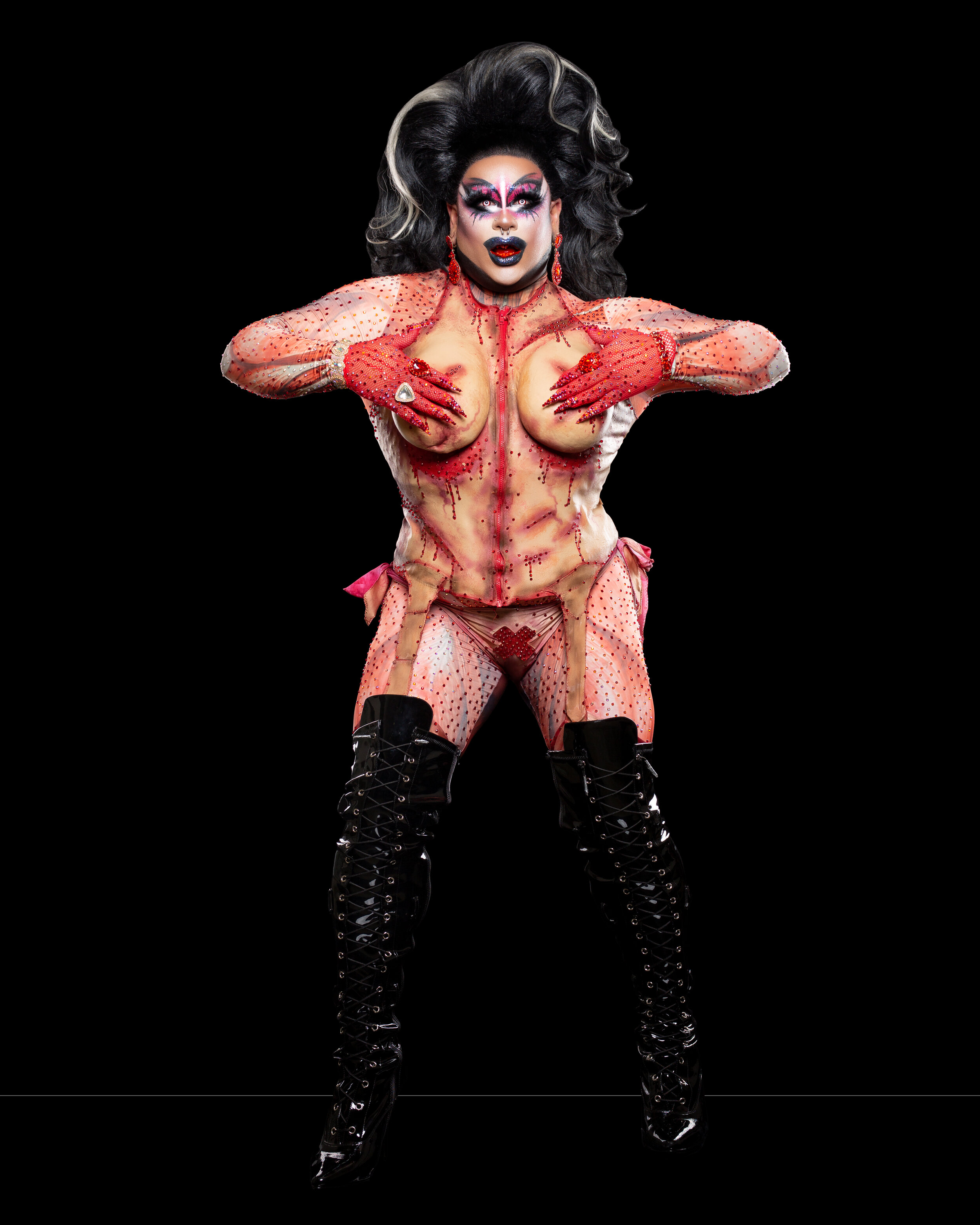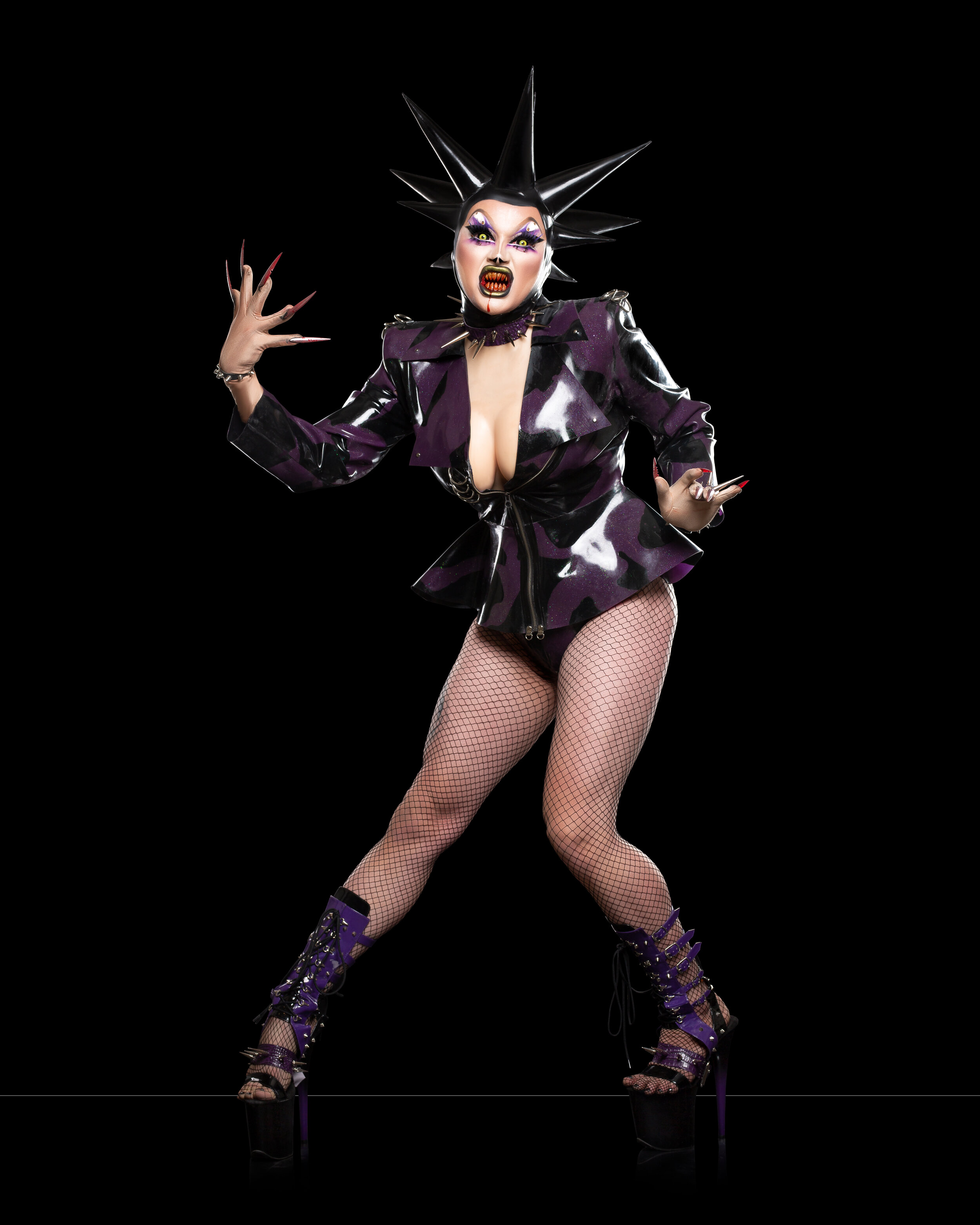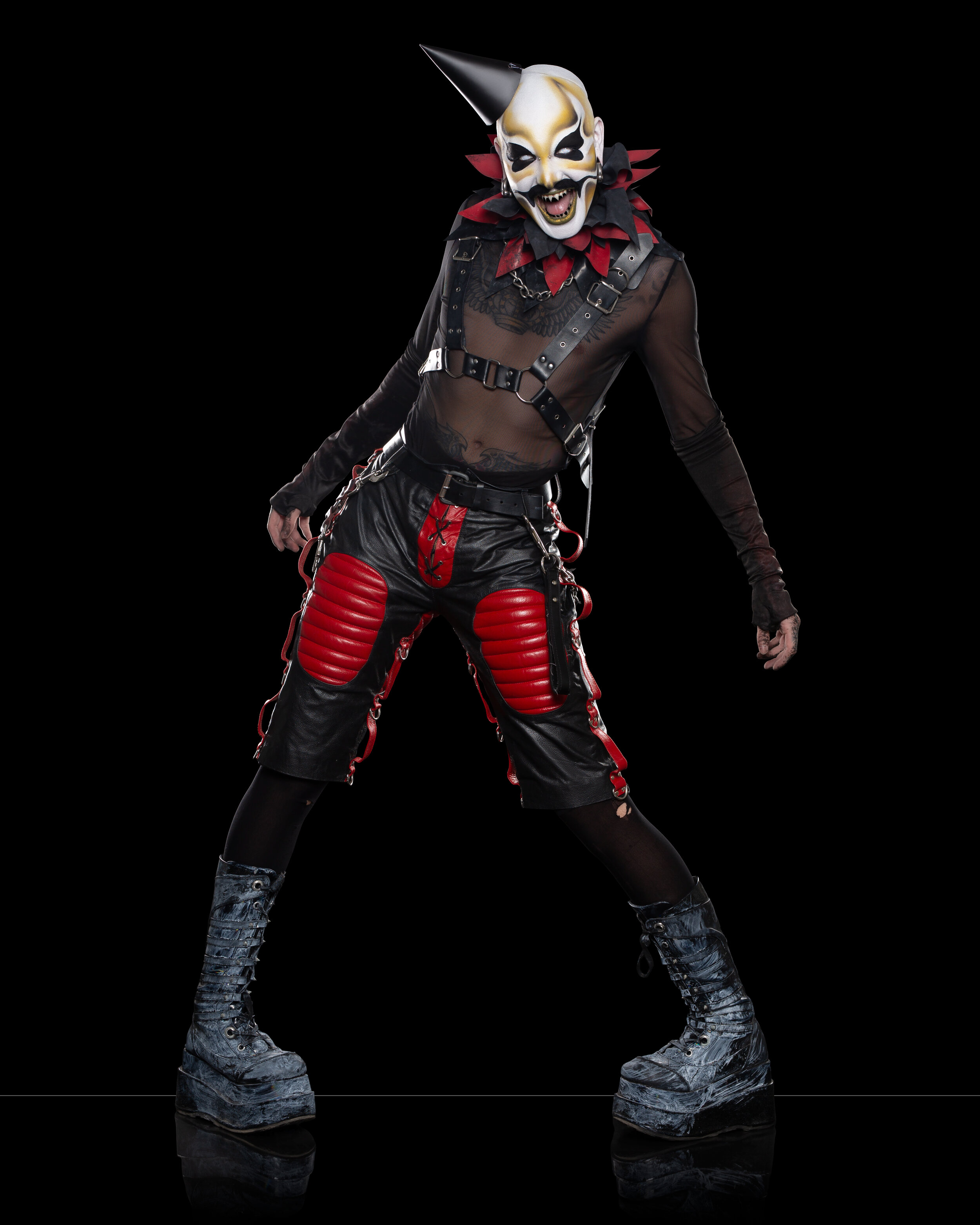Queer Filthy Horror- The Boulet Brothers’ Dragula: Resurrection (2020)
I started writing this solely as a review of The Boulet Brothers’ Dragula: Resurrection, touching on queer imagery (and life) within both the arts and day-to-day life, especially around Halloween. That, however, turned into something a hell of a lot grander. Most of the time when watching anything related to the Boulet Brothers, I find myself inspired, challenged (in the good way) and, above all else, comfortable and safe; this is my people and my world, and I want to support and love them every chance I get.
And so, I warn you now: this is going down a rabbit hole. Things are going to get surprisingly personal, which is not what I was expecting.
shrugs Deal with it, motherfuckers.
I should probably first address an elephant in the room before you start reading: I like using the word queer, and I’m going to use it quite a bit in this piece. It’s something I’ve discussed in a few different settings and areas, and I know that not everyone is comfortable with the word: so many of us have heard it used in a negative fashion, quite often directed to our face or heard that bit too loudly behind our back, usually used by someone outside of the queer community.
I say fuck them.
Queer, to me, is an inclusive word, and I fucking like taking ownership of it. Given the whole brain tumour/fucked-up-language side of things, it means something even more powerful to me now. In comparison, while I’m comfortable using LGBT, or LGBTQ or LGBTQ+ or variations thereof, I feel that such phrasing can be somewhat exclusive, which is definitely not the intent: should I be adding extra letters to include non-binary individuals? Or do they get nothing more than included in the +? That’s before getting into a discussion about what the Q stands for (can be used as both “questioning” and “queer.”) So, while I myself identify as a gay man, I feel most comfortable using the word queer when talking about the wider, larger community. Why? Because I like owning that fucking word for me and my people.
Some part of me always knew that I was queer, but growing up in the 80s and 90s in Ireland, I never really had the chance to understand queer and what it meant in a bigger picture. Yeah, I have a weird memory of having a childhood crush on Commander Riker from Star Trek: The Next Generation, a memory that only makes sense as I get older (yeah, hairy chests and cocky over-confidence are a good look.) Similarly, as a teenager, I remember going to concerts in the TBMC (Temple Bar Music Centre, now known as The Button Factory in Dublin) and finding not only other (male) attendees hot as fuck, but also some members of the bands.
There are multiple elements of Irish culture that I blame for this closed-off world: anything queer or gay was secret, a whisper when referring to the “friend of Dorothy” who lived around the corner (and, as a kid, you weren’t meant to know the meaning or understand what that meant.) I also remember sex education as a teenager in an overly Catholic and very religious school where such an education was given by a doctor, discussing how such a lesson was geared towards teaching us how to have “strong, healthy relationships with our future wives.”
I may paraphrase slightly, but the context remains similar; this was solely a chat about straight normality, and everything that wasn’t was Other.
It took college and being fucking 19 years of age to properly make sense of my own sexuality: I joined about 20 clubs or unions, at least one of which was a queer or LGBT club. I still remember the heart-attack of doing so, terrified that someone I knew might see me, might judge me, might tell the rest of my friends of family and then my deep, dark secret would be out. I don’t know whether I was more scared of that secret by myself, or by the notion of sharing it with other people. (For reference, I went to a grand total of VERY FUCKING FEW events for any clubs or unions in college.)
When I finally felt confident enough to say those words, to come out and deal with that shit, there was other stuff going on in the lives of my friends and family; my sexuality just wasn’t as big a deal as it felt but…I guess I also didn’t really have the skill set to make sense of the world.
It’s a skill set that, some part of me, is still bitter about, with society and culture as a whole never actually showing or allowing such a skill-set. In amongst all those secret words and languages, there were no queer role models to learn from in any way. I’m also going to say this now, and someone is going to hurt but…let’s be honest, the straight community aren’t always as supportive as they think they are, nor as the queer community needs and wants: they will help to fight our battles now, but twenty fucking years ago when I didn’t know what I was fucking fighting (mostly myself) there was nobody there to help with that fight. Similarly, my aforementioned sex-education session in school did mention that, if any of us had leanings…we should talk to an adult…before we put ourselves in danger…because of course, queer meant danger.
In retrospect, said “danger” was random hook-ups, beatings, rape or worse, perhaps after being “caught” in the act, but to an inexperienced teenager, it sounded an awful lot like this adult was telling us how bad it was just to be queer.
With all of that in mind, is it really that unusual that so much of the queer community, especially those of us who were raised in Ireland, with the suggestion that we’d probably end up going to hell, we would end up linking all things queer with all things horror and terror?
Presenters, The Boulet Brothers
It can’t be just me, but there is definitely some connection there wherein we are feeling somewhat safer with the threat of the Weird and the Other, perhaps because of the very fact that a) some part of us feels like we are already living through the same, and b) there’s something fucking nice about seeing everyone else going through it too.
We are comfortable watching slasher films in which that straight teenage couple who have just had sex will die. As a queer, there is a chance that such sex may lead to pregnancy and we are somewhat confident that that will never be us? Or maybe, just maybe, some part of us relates so much with the killer themselves because we can relate, because we see some of our own reflection, someone who is so very angry and broken by such open, brazen and confident reveals of straight sexuality.
Because to the people living within that world of straight sexuality, many are so confident and brazen that they don’t even realise how broad and large the community of the Other is, and the thought of anyone or anything queer must be a small, simple world.
In this context, both the queer and alternative communities have, to me, always felt like they are Other.
But both are nonetheless widely visible, played and manipulated in equal measure for the sakes of marketing, branding or awareness. When I attend Pride, I roll my eyes at the large, branded trucks, T-shirts and posters, wondering where those brands were then I needed them to be present and open for me, not to mention where they are through the rest of the year. When I attend concerts, shows or even wrestling events, I wonder where is all that swagger and pride in the Other through the rest of time.
Such touches of Other are, unfortunately in those circumstances, dressed and coloured by booze and showmanship: maybe, just maybe, you could show such swagger every other day too. Because maybe, just maybe, someone else really fucking needs or wants to see that swagger when they are having a shit day and are feeling like they are the smallest, person in the world and they are the Other.
Such is a lot of the truth that my brain connects with tattoos, piercings, clothing, little touches of the Alternative that are often hidden and forgotten about and I must confess that, once upon a time, I wanted and was willing to hide in the name of finance and career.
Then your head fucks you up and you realise that finance and career don’t do shit for you, but the people and the world where you can find that support and confidence is still there.
Such is my feeling about The Boulet Brothers’ Dragula, Yeah, you knew I’d get there eventually, right?
Where the fuck was this show when I needed it?
Not to say that such a world didn’t and doesn’t exist, but in the 90s and 00s, back when the internet wasn’t really as big a thing, and videos didn’t exist and such shit, such a world was hidden and invisible to so many people. That singular queer character on TV or in a movie was probably either the murder victim, the fucked-up-killer or the comedic side-character; that coming-out story in the tabloid was one of shock and shame, not warmth and welcome.
It’s only really in the last five-to-ten years that I have started to see such characters and stories on my screens. Or maybe it’s because I am now willing, ready and able to see and appreciate them also. RuPaul’s Drag Race eased me into this space, and I began with a recommendation of season four, a world in which Sharon Needles played with my spooky, horror-leaning sensibilities, allowing me to see a place where those worlds would and could cross over. And indeed, such worlds have crossed over, aggressively so within the last ten years.
Perhaps a bit too comfortably. Now, when I watch Drag Race, I no longer see the Other or the Outsider; I see some very similar people, people who will address the Other and the Outsider but who will edge away from it in the name of branding and finances, making the Other more visible and acceptable to a wider audience that includes the straight women and hens parties who have fallen for such drag. Such an audience feels safe and inclusive within the queer community, but by invading such communities, are proving closer to the cause than the symptom.
It’s with an air such as this which has led to my significant love for the Dragula world and community, a somewhat low-rent (at least to begin with) take on the drag competition but, while RuPaul’s focuses on the female illusion, Dragula embraces drag, filth, horror and glamour. (Don’t judge me for spelling glamour the way I want, dammit!)
Born from a club night that took place in San Francisco and Los Angeles, the Boulet Brothers of the title (Dracmorda and Swanthula) act as co-hosts and judges for a collection of queer arts and arts within queer space. Initially a somewhat secret, low-rent show, Dragula now has three seasons, each with significant improvements to the production values (and, one would assume, more money.) The show is available across a couple of different outlets, varying depending on global location: we’ve watched through Amazon Prime Video, but I think it available on Netflix in some areas, and in other areas it’s available in varying different formats and outlets.
Dragula embraces a different type of drag than the other, bigger competitions, often calling attention to the fact that, unlike other shows, this is not about the female illusion, but about art and the grander picture of how and why the role of gender plays within culture, challenging its its audience with a clusterfuck of competitors, mentalities and narratives. The show has featured a number of acts that have worn masks, playing more with art and humanity than solely gender. And because of the fact that Dragula is more about the art than the “female illusion,” many of the previous winners have proven that they are very fucking capable of doing so, from the beautifully weird (and weirdly beautiful) Vander Von Odd, the gorgeously slutty, boob-heavy rock-goddess Biqtch Puddin’ or drag king (yep, the show has crowned a drag king) Landon Cider.
Dragula is a powerful lesson to watch on the TV and even more powerful to see or meet in person. The Boulet Brothers (shocker…they are not actually women…or brothers!) have managed to bring the live show to Dublin on two separate occasions, and myself and my husband have been lucky enough to meet the Boulets, the queens and some of the production teams. On both occasions, the shows have taken place in locations what I would describe as Alternative Spaces (the TBMC makes its comeback, yo!), with the cast posing as rock-bands, animals or monsters, and performing to music that is definitely alternative. I’m pretty sure I’ve now seen the Dragula gang lip-sync to Marilyn Manson songs at least four or five times, and it is such a correlation of Queer and Other that led me to get my own latest, queer tattoo courtesy of Vic Levins at True Electric Tattoo here in Dublin.
The show embraces non-binary drag, art and sexuality throughout and it is somewhat fitting that there have been talks and suggestions of an “All-Stars” reunion show for some time (mentioned in the Boulet’s podcast, Creatures Of The Night, available on a number of different outlets)
With that in mind, it feels somewhat appropriate writing this on Halloween (only two days after my big gay wedding anniversary) during the crazy lock-down courtesy of Covid-19. After watching The Boulet Brothers Dragula: Resurrection last week, it has taken me some time to review things in my head, to think about what I wanted to say and how I wanted to say it.
Because, perhaps, such a show is not about competition; it is not about winning money, or branding or showing off. Rather, I find that all things Dragula are about making oneself comfortable in your own skin, and with all the fucking icky shit and scars that come along with it.
A special, exclusively available on horror outlet Shudder, Resurrection brings back seven competitors from seasons 1-3 with the the prize of bringing someone back for season 4. Interestingly with such a narrative, this two-hour special turns away from competition and more about embracing some sort of analysis of art, sexuality and gender and how these apply to the world both within and outside of drag and competition. All seven competitors offer powerful entertaining looks across three levels: witch, ghost and vampire, somewhat fitting with the Shudder placement (even if, in doing so, the show seems to omit the feelings of glamour and filth that can sometimes be the most entertaining.)
Given the nature of the show and the competition, I’m not going into details on competitors or their looks: watch the fucking show and this special, losers, especially when you get the chance to do so at this glorious time of year.
Frankie Doom
Loris
The Dahli
Kendra Onix
I haven’t been lucky enough to meet some of the competition as above, but just look at those looks: from the first season Frankie Doom, Loris and from season two, The Dahli, and Kendra Onixx. Guys, if any of you lot have ever made it to Dublin, I’m sorry that I haven’t seen you, but fucking hell you are all stunning and I want to see and support more of you in real life.
However, I was also lucky enough to have met Saint (previously known as St Lucia), Priscilla Chambers and Victoria Elizabeth Black earlier this year. Having met them in person, all of their performances in this show are especially powerful: entertaining while also grim and challenging, they’re the kind of things that make you really want to think about and challenge cultural “norms.”
For reference, I was not aware that Priscilla was transitioning when in Dublin January 2020, so it sort of makes me feel weird about the picture below.
But I also think there’s something very powerful and right in such an image too, because it fucking challenges all those stupid fucking “norms” about gender, sexuality and identity. And, let’s be honest, she fucking looks amazing, and the fact that she performed to “Celebrity Skin” by Hole while dressed as trash makes me love her all the more. Her look in Resurrection addressing trans rights and life is…stunningly powerful and powerfully stunning.
Saint
Priscilla Chambers
Victoria Elizabeth Black
Going any deeper into the narrative of The Boulet Brothers’ Resurrection will take away from some of the fun that applies on an artistic, sexual and cultural level, so it seems more appropriate to just tell you to watch the fucking thing.
This type of shit is important within the queer community, within all communities as they put some effort into accepting and embracing all things Other and Queer.
Stop looking on them as weird or scary because maybe, just maybe, someone very fucking close to you is afraid of being Other or Queer, afraid that you will look at them in the same way.













